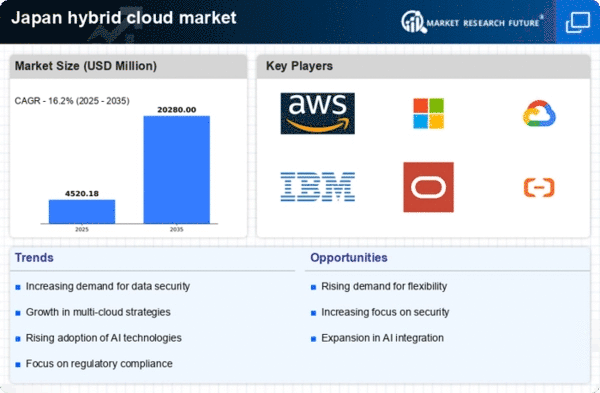Emergence of Edge Computing Solutions
The hybrid cloud market in Japan is increasingly influenced by the emergence of edge computing solutions. As the demand for real-time data processing grows, organizations are turning to hybrid cloud architectures that incorporate edge computing capabilities. This approach allows businesses to process data closer to the source, reducing latency and improving performance. The hybrid cloud market is likely to benefit from this trend, as companies seek to enhance their operational efficiency and responsiveness. It is estimated that the edge computing market in Japan could reach $5 billion by 2026, further driving the adoption of hybrid cloud solutions that support edge computing initiatives.
Rising Demand for Flexible IT Solutions
The hybrid cloud market in Japan experiences a notable surge in demand for flexible IT solutions. Organizations are increasingly seeking to optimize their IT infrastructure, allowing for a blend of on-premises and cloud resources. This flexibility enables businesses to scale operations efficiently, responding to fluctuating market conditions. According to recent data, approximately 60% of Japanese enterprises are expected to adopt hybrid cloud solutions by 2026. This trend reflects a broader shift towards agility in IT management, as companies aim to enhance operational efficiency while minimizing costs. The hybrid cloud market is thus positioned to benefit from this growing inclination towards adaptable IT frameworks, which facilitate innovation and responsiveness in a competitive landscape.
Growing Regulatory Compliance Requirements
The hybrid cloud market in Japan is increasingly shaped by growing regulatory compliance requirements. As data protection laws become more stringent, organizations are compelled to adopt solutions that ensure compliance with local regulations. Hybrid cloud architectures provide the necessary flexibility to manage sensitive data while adhering to legal standards. Approximately 50% of businesses in Japan are expected to enhance their compliance strategies through hybrid cloud solutions by 2025. This trend highlights the critical role of the hybrid cloud market in facilitating compliance, as companies navigate complex regulatory landscapes while leveraging the benefits of cloud technologies.
Enhanced Focus on Disaster Recovery Solutions
In Japan, the hybrid cloud market is significantly influenced by an enhanced focus on disaster recovery solutions. Given the country's susceptibility to natural disasters, organizations are prioritizing robust backup and recovery strategies. Hybrid cloud solutions offer a compelling advantage, allowing businesses to store critical data across multiple environments, thereby ensuring continuity in the face of disruptions. Recent statistics indicate that around 45% of Japanese companies are investing in hybrid cloud technologies specifically for disaster recovery purposes. This trend underscores the importance of resilience in the hybrid cloud market, as firms seek to safeguard their operations and maintain service availability, even during unforeseen events.
Increased Investment in Digital Transformation
The hybrid cloud market in Japan is witnessing increased investment in digital transformation initiatives. Organizations are recognizing the need to modernize their IT infrastructure to remain competitive in a rapidly evolving digital landscape. Hybrid cloud solutions play a pivotal role in this transformation, enabling businesses to integrate advanced technologies such as AI and big data analytics. Recent reports suggest that spending on digital transformation in Japan is projected to reach $100 billion by 2025, with a significant portion allocated to hybrid cloud services. This trend indicates a robust growth trajectory for the hybrid cloud market, as companies seek to leverage cloud capabilities to drive innovation and enhance customer experiences.
















